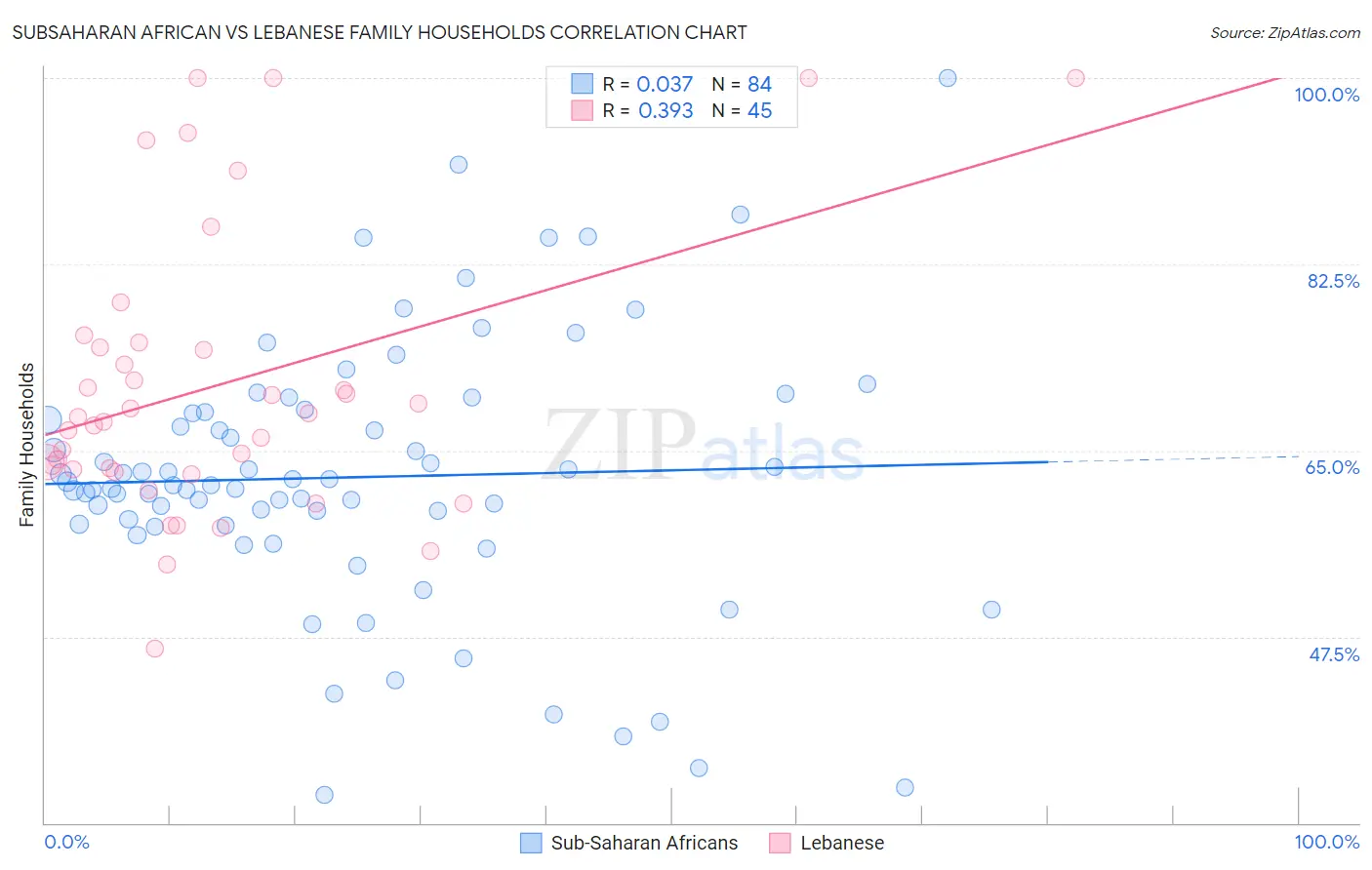Subsaharan African vs Lebanese Family Households
COMPARE
Subsaharan African
Lebanese
Family Households
Family Households Comparison
Sub-Saharan Africans
Lebanese
62.1%
FAMILY HOUSEHOLDS
0.0/ 100
METRIC RATING
309th/ 347
METRIC RANK
64.4%
FAMILY HOUSEHOLDS
66.4/ 100
METRIC RATING
158th/ 347
METRIC RANK
Subsaharan African vs Lebanese Family Households Correlation Chart
The statistical analysis conducted on geographies consisting of 507,604,715 people shows no correlation between the proportion of Sub-Saharan Africans and percentage of family households in the United States with a correlation coefficient (R) of 0.037 and weighted average of 62.1%. Similarly, the statistical analysis conducted on geographies consisting of 401,332,213 people shows a mild positive correlation between the proportion of Lebanese and percentage of family households in the United States with a correlation coefficient (R) of 0.393 and weighted average of 64.4%, a difference of 3.9%.

Family Households Correlation Summary
| Measurement | Subsaharan African | Lebanese |
| Minimum | 32.6% | 46.4% |
| Maximum | 100.0% | 100.0% |
| Range | 67.4% | 53.6% |
| Mean | 62.5% | 71.1% |
| Median | 61.7% | 68.2% |
| Interquartile 25% (IQ1) | 58.0% | 63.1% |
| Interquartile 75% (IQ3) | 68.6% | 74.9% |
| Interquartile Range (IQR) | 10.5% | 11.8% |
| Standard Deviation (Sample) | 12.5% | 13.3% |
| Standard Deviation (Population) | 12.4% | 13.1% |
Similar Demographics by Family Households
Demographics Similar to Sub-Saharan Africans by Family Households
In terms of family households, the demographic groups most similar to Sub-Saharan Africans are Immigrants from Liberia (62.0%, a difference of 0.040%), Immigrants from Norway (62.1%, a difference of 0.050%), Chippewa (62.1%, a difference of 0.050%), Immigrants from Morocco (62.0%, a difference of 0.070%), and Immigrants from Latvia (62.0%, a difference of 0.12%).
| Demographics | Rating | Rank | Family Households |
| Immigrants | Kenya | 0.0 /100 | #302 | Tragic 62.3% |
| Cree | 0.0 /100 | #303 | Tragic 62.3% |
| Iroquois | 0.0 /100 | #304 | Tragic 62.2% |
| Bermudans | 0.0 /100 | #305 | Tragic 62.2% |
| Africans | 0.0 /100 | #306 | Tragic 62.1% |
| Immigrants | Norway | 0.0 /100 | #307 | Tragic 62.1% |
| Chippewa | 0.0 /100 | #308 | Tragic 62.1% |
| Sub-Saharan Africans | 0.0 /100 | #309 | Tragic 62.1% |
| Immigrants | Liberia | 0.0 /100 | #310 | Tragic 62.0% |
| Immigrants | Morocco | 0.0 /100 | #311 | Tragic 62.0% |
| Immigrants | Latvia | 0.0 /100 | #312 | Tragic 62.0% |
| Liberians | 0.0 /100 | #313 | Tragic 62.0% |
| Immigrants | Cabo Verde | 0.0 /100 | #314 | Tragic 61.9% |
| Moroccans | 0.0 /100 | #315 | Tragic 61.9% |
| Immigrants | Middle Africa | 0.0 /100 | #316 | Tragic 61.9% |
Demographics Similar to Lebanese by Family Households
In terms of family households, the demographic groups most similar to Lebanese are Canadian (64.4%, a difference of 0.0%), Czech (64.5%, a difference of 0.010%), German (64.4%, a difference of 0.010%), Uruguayan (64.5%, a difference of 0.020%), and Immigrants from Moldova (64.4%, a difference of 0.020%).
| Demographics | Rating | Rank | Family Households |
| Syrians | 75.2 /100 | #151 | Good 64.5% |
| Scottish | 70.9 /100 | #152 | Good 64.5% |
| Swedes | 69.8 /100 | #153 | Good 64.5% |
| Austrians | 68.5 /100 | #154 | Good 64.5% |
| Uruguayans | 67.7 /100 | #155 | Good 64.5% |
| Czechs | 67.0 /100 | #156 | Good 64.5% |
| Canadians | 66.6 /100 | #157 | Good 64.4% |
| Lebanese | 66.4 /100 | #158 | Good 64.4% |
| Germans | 65.8 /100 | #159 | Good 64.4% |
| Immigrants | Moldova | 65.2 /100 | #160 | Good 64.4% |
| Immigrants | England | 62.6 /100 | #161 | Good 64.4% |
| British | 61.6 /100 | #162 | Good 64.4% |
| Chickasaw | 61.5 /100 | #163 | Good 64.4% |
| Immigrants | Nigeria | 60.1 /100 | #164 | Good 64.4% |
| Immigrants | Southern Europe | 60.0 /100 | #165 | Good 64.4% |